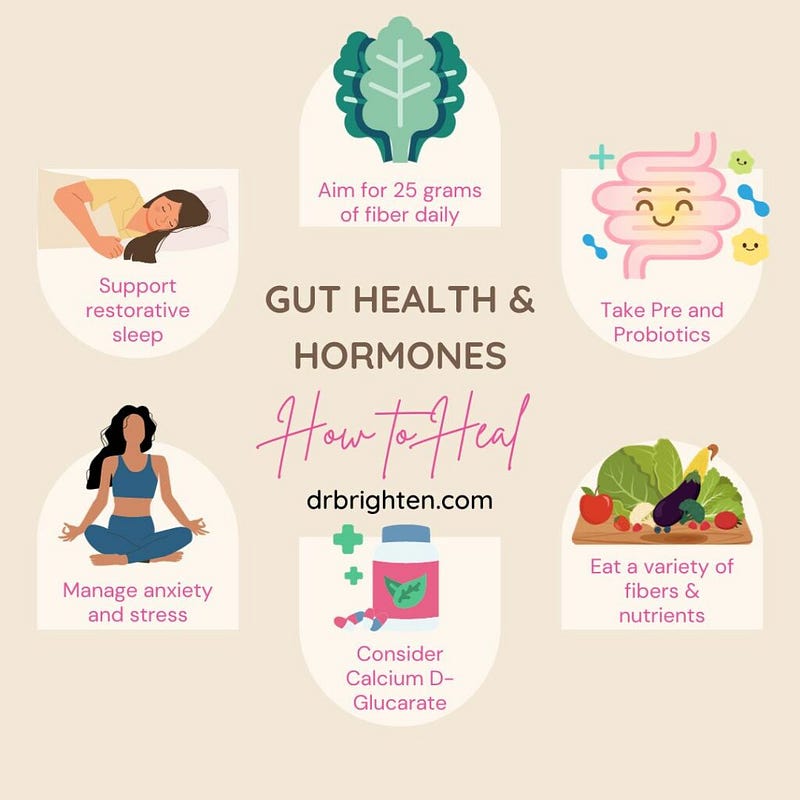The Gut-Hormone Connection: A Key to Women's Health
Written on
Chapter 1: The Gut as a Hormonal Hub
The human body exhibits extraordinary complexity, with numerous systems harmonizing to ensure overall health. Although hormones are typically associated with glands like the ovaries and adrenal glands, recent studies highlight the gut's vital function in both hormone production and regulation. This intricate relationship between the gut and hormones significantly affects women's health, especially in conditions such as endometriosis and polycystic ovary syndrome (PCOS).
Section 1.1: The Gut: Our Internal Hormone Factory
The gut, often referred to as the "second brain," hosts a diverse community of bacteria known as the gut microbiota. This microbiota is essential for various bodily functions, including digestion, immune response, and metabolism. Recent research indicates that the gut microbiota is also responsible for producing and regulating hormones that impact numerous physiological processes.
Subsection 1.1.1: Key Hormones Produced in the Gut

Several hormones generated in the gut are critical to women’s health, including:
- Serotonin: Commonly known as the "happy hormone," serotonin is mainly linked to mood regulation but is also produced in the gut, affecting gastrointestinal motility. Imbalances in gut-derived serotonin have been associated with irritable bowel syndrome (IBS) and depression, conditions that are particularly common in women.
- Estrogens: Although estrogen is primarily produced in the ovaries, a significant portion of its metabolism occurs in the gut. The gut microbiota is vital for metabolizing estrogen, and disruptions here can lead to imbalances associated with conditions like endometriosis, PCOS, and breast cancer.
- Ghrelin: Often referred to as the "hunger hormone," ghrelin is produced in the gut and regulates appetite. Disruptions in ghrelin levels can lead to obesity and insulin resistance, both of which are significant health concerns for women.
- Leptin: Produced in both adipose tissue and the gut, leptin helps regulate energy balance. Disturbances in leptin signaling can be linked to obesity and reproductive issues, such as PCOS and infertility.
Section 1.2: The Impact of Gut Hormones on Women's Health
The connection between the gut and hormones has important implications for various women's health issues, including:
- Endometriosis: This chronic inflammatory condition involves the presence of endometrial-like tissue outside the uterus. The metabolism of estrogen in the gut may influence the development of endometriosis, as imbalances in estrogen can promote the growth of ectopic tissue.
- Polycystic Ovary Syndrome (PCOS): Characterized by irregular menstrual cycles and elevated androgen levels, PCOS can be exacerbated by the dysregulation of hormones like ghrelin and leptin, leading to insulin resistance and obesity.
- Mood Disorders: Women are more likely to experience mood disorders, which are often linked to changes in gut microbiota. An imbalance in gut microbiota can contribute to the development and worsening of conditions like depression and anxiety.
Chapter 2: Leveraging the Gut-Hormone Connection
Understanding the complex relationship between the gut and hormones is essential for creating effective strategies for managing women's health issues. Interventions targeting the gut microbiota—such as dietary changes, probiotics, and prebiotics—may hold promise for enhancing hormone production and improving health outcomes in conditions like endometriosis, PCOS, and mood disorders.
The first video, "The Impact of Hormones on the Gut," delves into how hormonal changes influence gut health and vice versa, exploring the bidirectional relationship between these systems.
The second video, "Are Your Hormones Making Your Digestion Worse?" examines the ways hormonal imbalances can negatively affect digestive health, emphasizing the importance of maintaining gut harmony for overall well-being.
The gut serves as a central hub for hormone production and regulation, profoundly influencing women's health. By understanding the intricate connections between the gut microbiota and hormones, researchers and healthcare providers can develop innovative approaches to address the root causes of hormone-related disorders and promote holistic wellness.